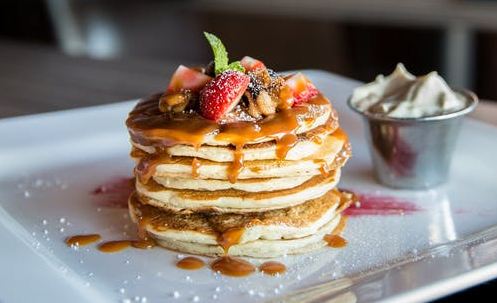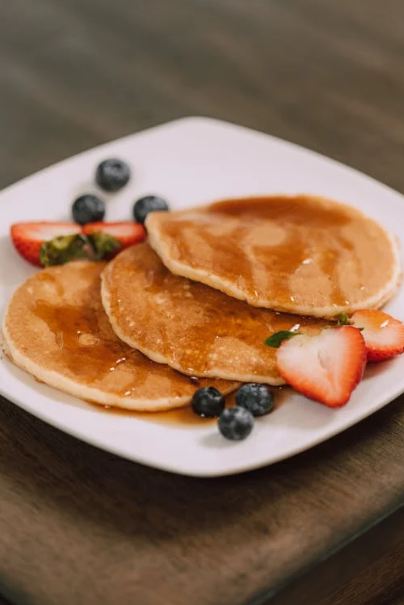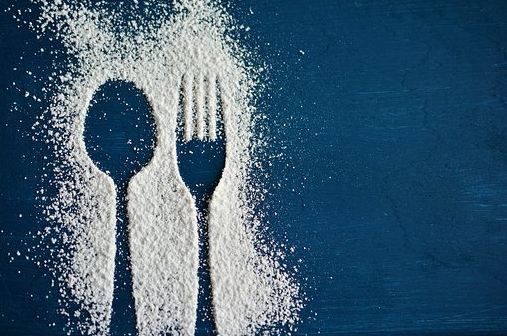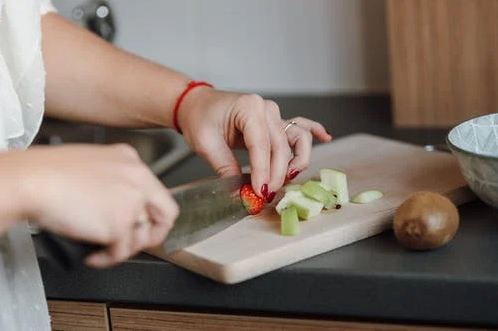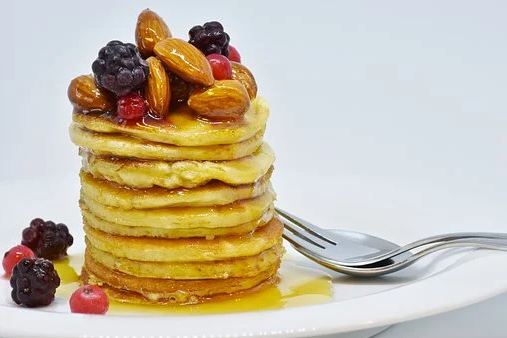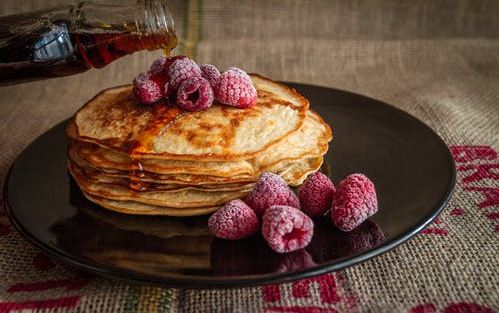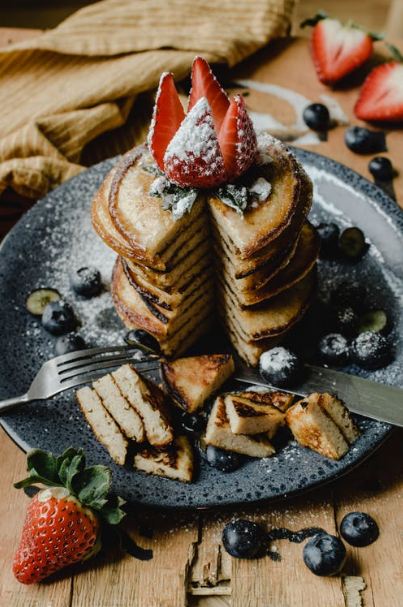Serving yourself pancakes for the breakfast is light, comforting, and fluffy. Pancakes are not considered a healthy food, even for the breakfast. But there are some nutrients in the pancakes that make them healthy for you. Pancakes are made from refined flour and there is not much filling. Some people prefer to have eggs, fruits, yogurt, oats, etc. for breakfast. People prefer something rich in protein in their breakfast to keep them energetic till mid-day.
There are plenty of different recipes for making pancakes. Some of them include fruits. If you are using a lot of fruit in it, then it would be a healthy breakfast. They are very sweet with maple syrup and you will crash till the mid-day when all of the sugar has been consumed.
Are Pancakes Healthy for Your Breakfast?
Eating a healthy breakfast means that you are heading to a good start to the day. There are many choices for you to eat in breakfast and to keep yourself energized. Smart choices are hard to make. Choosing pancakes for your breakfast is a healthy option that provides good and high-quality carbohydrates, a range of minerals and vitamins. Along with this, pancakes contain a relatively higher amount of fat, sodium, and calories.
You can include pancakes in your breakfast list with occasional serving. They can be included in your healthy diet plan. In case, you are having a wheat gluten allergy, there are some breakfast alternatives that you can add to your healthy breakfast list.
Pancake Nutrition

If you like to have an ideal breakfast, then it must be having 350 to 500 calories. It depends on the needs of your nutrition. A 3.5 ounce of pancake serving contains 221 calories. If you are adding butter and maple syrup to your pancake, then it adds fats and more calories. The additional calories do not remove the pancakes from the healthy breakfast list but yes, the fat does. A 3.5 ounce of pancake serving contains
- 8.8g of fat
- 3.9g of saturated fats
- 27.2g of carbohydrates
- 8.1g protein
27.2g of carbohydrates is 8.3 to 12 percent of the carbohydrates required in a day. 8.1g of protein serves the need of 14.4 to 17.6 percent of required protein intake. According to Dietary Guidelines for Americans, 2015-2020, one should not be taking in more than 10 percent of daily calories in saturated fats. If there are 3.9 grams of saturated fat in your pancake, then you should try a lower-calorie pancake for your healthy breakfast.
Sugar and Sodium in Pancakes

Pancakes consist of savory and sweet taste. The sweetness in pancakes comes from the addition of granulated sugar as mentioned in pancake recipes. There is 4.3g of sugar in a serving of pancake. If you are adding maple syrup, then you are adding more sweetness with fats in your pancakes. Health Gov. Dietary Guidelines for Americans 2015-2020, recommends limiting the sugar intake. It should be less than 10 percent of your daily calories.
If you still want to make your pancakes sweet, you can simply add fresh fruits instead of using syrups which add up sugar and fats. When you add butter to your pancakes, you consume 308 mg of sodium per serving. The standard limit of sodium or salt consumption is limited to 1,500 to 2,300mg. You should not cross the suggested limitation of sugar and sodium to stay healthy.
Vitamins and Minerals

Adding pancakes to your breakfast menu is not a bad option. It is a good source of phosphorus and calcium. It gives you 20 percent of phosphorus and 18 percent of calcium of the recommended daily intake. A pancake is a smart option for boosting the strength of bones and the ability of your body to make RNA and DNA. Along with this, pancakes also serve 12 percent of iodine and riboflavin for your daily recommended intake. Pancakes also give you smaller amounts of vitamin C, vitamin B6, vitamin B12, thiamin, niacin, magnesium, zinc, iron, and copper.
A Source of Iron

Are pancakes a source of iron? Yes, they are! A serving of whole-wheat pancakes provides you about 3milligrams of the essential mineral. You need around 16 to 38 percent of iron daily, which can be fulfilled by eating pancakes for the breakfast. Now the iron consumption depends on sex and age. The buttermilk pancakes provide you 2 milligrams of iron.
Iron contributes to the energizing properties that can be consumed by eating pancakes. They can also be important for making your immune system stronger, by providing iron to immune cells. You can fight off diseases in the future.
Calcium for Stronger Bones
Pancakes are considered to provide more saturated fats and sugar, but in fact, they provide a good source of calcium. A serving of whole-wheat pancakes gives you about 250 milligrams of calcium. In the daily intake of calcium, you need one-quarter of calcium that is fulfilled by the serving of pancakes. The buttermilk pancakes provide you around 180 milligrams of calcium that makes 18 percent of your daily intake.
How to Make Healthy Pancakes for Your Breakfast?

Most of the recipes of pancakes recommend using white flour. It does not offer much nutrition and filling. You can use whole-wheat or whole-grain of oats, buckwheat, or cornmeal flour to make pancakes. Whole-wheat consists of 16 grams of fiber in a cup as compared to 3 grams of fiber in a cup of white flour. If you are hesitant about making whole-wheat pancakes, then make it 50 percent whole-wheat and 50 percent of white flour.
Don’t pat your pancakes. If you like fluffy pancakes, then don’t pat them with the spatula after flipping. In this way, the air is compressed inside the pancakes and it makes the pancake dense. Adding syrup to the pancakes adds more sugar and saturated fats. Instead of using syrups, add fruits and nuts for a better flavor. You can add blueberries for added sweetness and cancer-fighting anthocyanins. You can also add raspberries for vitamin C and fibers.
If you don’t have time in the morning for making pancakes, you can do it ahead of time. The ingredients used in the pancakes can be stored and refrigerated for a week and so. Keep in mind that you have to change the toppings with time. A little goes a long way. A teaspoon of butter with few tablespoons of syrup would be enough for your healthy breakfast.
Alternatives of Pancakes

If you are a pancake fan and they are part of your healthy breakfast menu, then it is a good option because the whole-wheat pancakes provide you with extra fiber and whole grains. The pancakes made from wheat flour are not a good option for a person who is allergic to wheat gluten. He/she should avoid it. With different changes in the recipe, you can add them to your healthy breakfast menu.
You can buy a pre-made mix for pancakes that are made from gluten-free grains. They are made from corn, rice, and quinoa. These alternatives are the best option for gluten allergic persons. It provides a good texture with proteins. It does not trigger the celiac disease that is triggered by the wheat among gluten allergic persons. The buckwheat, despite its wheat-name, is also gluten-free and can be used for making delicious pancakes.
Verdict
Some people consider it as a fatty breakfast and not good for them. It is because of the added syrups and sugars. If you make healthy pancakes with fruits and other ingredients, it is one of the healthy breakfasts for your daily routine!

